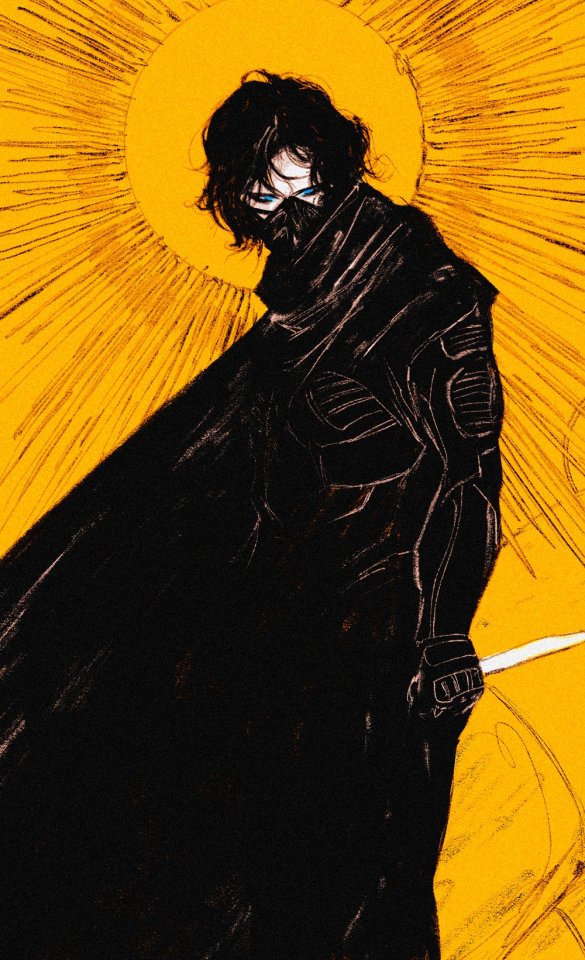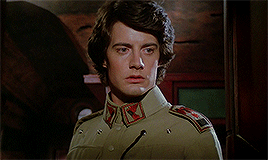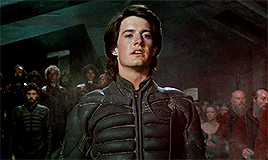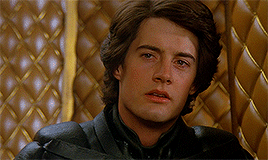I Like Dune

I like Dune
More Posts from Mariefenring and Others
Still having Chani feelings, man. Because I think it is actually not that common to see a character (but especially a female character) whose main commitment in life is to a political struggle, and to have that be taken seriously by the narrative. Not painted as naive idealism or a trendy lifestyle choice or something the character eventually leaves behind for "real" commitments like marriage, career or children.
We don't see really anything of Chani's home life in the sietch, but it seems reasonable to infer that the fedaykin are what she's built her life around. The very first thing we learn about her, before we even know her name, is that she's a fighter. This is a core part of her identity.
She falls in love with Paul when he's willing to risk his life beside her as an equal, for a cause that she can't escape but he could walk away from if he chose. The question she asks him is not Do you love me? but Will you always be with me? Will you always be beside me in the struggle, fighting for the same things I am?
And as soon as the answer to that question is no, they're over. There is absolutely no possibility of love overriding that political betrayal, because her love for him is inextricable from coming to trust that he is committed to their liberation and not simply trying to use them. He said over and over again that he didn't want power, and as soon as he reaches out to claim it there is no way they can be together. The worst betrayal isn't watching him choose another woman, it's watching him declare himself emperor and send her own people off to slaughter others when he said he was fighting for their freedom.
So she leaves him, and we're never supposed to see it as anything but justified. There is simply no way she will turn her back on the most important thing in her life for him.








DUNE (1984) dir. DAVID LYNCH
A beginning is a very delicate time. Know then, that it is the year 10191. The known universe is ruled by the Padisha Emperor Shaddam IV, my father. In this time, the most precious substance in the Universe is the spice melange. The spice extends life. The spice expands consciousness. The spice is vital to space travel. The Spacing Guild and its navigators, who the spice has mutated over four-thousand years, use the orange spice gas, which gives them the ability to fold space. That is, travel to any part of the Universe without moving. Oh yes, I forget to tell you. The spice exists on only one planet in the entire Universe. A desolate, dry planet with vast deserts. Hidden away within the rocks of these deserts are a people known as the Fremen, who have long held a prophecy, that a man would come, a messiah, who would lead them to true freedom. The planet is Arrakis. Also known as Dune.





alia atreides & marie fenring.
"in the blood" by john mayer / portrait of elisabetta gonzaga by raffaello sanzio / adeleide by hiroshi furuyoshi / fatima aamer bilal / fair rosamund and eleanor by frank cadogan cowper










The Films of David Lynch:
I must not fear. Fear is the mind-killer. Fear is the little-death that brings total obliteration. I will face my fear. I will permit it to pass over me and through me. And when my fear is gone I will turn and face fear’s path, and only I will remain.
Dune // 1984
Something I find interesting when viewing the two recent Dune movies as a whole is that initially, Paul is more than willing to use the prophecy and his visions for his own gain to convince Liet to help them, while Jessica whispers "careful!" at his side, and she later recommends they leave the planet entirely. But Paul decides they'll stay with the Fremen. Even at the beginning of Part 2, Paul is like "fuck yeah let's wage war on the Harkonnen" and Jessica is again counseling caution: "your father didn't believe in revenge." She goes through the Water of Life ceremony not because she wants to help Paul fulfill the prophecy but because she's forced to: do this or die. And even then, the old Reverend Mother had to use the Voice on her to get Jessica to drink.
That all changes when Jessica nearly dies during the ceremony. After that, Paul becomes more wary of embracing the prophecy, and she just throws herself into it. Paul nearly loses his mother (and his unborn sister) to a painful, agonizing poison - mere hours/days after losing his father and all their friends/allies to the Harkonnen slaughter - and decides it's not worth it. Meanwhile, Jessica gets a direct download of memories of millennia of oppression and goes "yeah let's burn everything to the ground."
It's an interesting, quick reversal at the beginning of the second movie, and it's great.
Ooh thank you for this great ask. I can always count on you for smart and thoughtful Jessica takes!
You make a really good observation about their reversal of positions--I had been struggling to figure out how Paul's line about "I must sway the non-believers" fit into his overall arc, but you are absolutely right that this feels like a continuation of how he talks to Liet. We're seeing the first stirrings of that little "maybe I am special" thought that later takes center stage.
For most of Part Two, Paul has several reliable counterweights pulling against that streak of arrogance and high-handedness that he's had from the beginning. Jessica almost dies drinking the Water of Life, which, like you point out, has got to make him think twice about encouraging people to believe in the prophecy. Then, he spends most of the movie surrounded by Chani and her friends and comrades, who seem the most skeptical of the prophecy and also aren't going to give his ego the time of day. And at the same time, he has an opportunity to pour his desire for revenge into collective political action that seems to be making a difference.
It's only when those countervailing forces start collapsing (the people who had started out as his equals are now becoming his followers; the Harkonnens attack Sietch Tabr and other civilian population centers, proving they are far from militarily defeated; Gurney shows up and immediately offers what seems like an easy solution to their problems that only Paul can access) that the little maybe I am special voice starts winning again.
As for Jessica, her journey doesn't get as much focus in the movie but it's also fascinating. She's a great character because she is so fucking smart at navigating power structures from what seems like an unenviable position. Did she have any choice about being sent to Caladan to become Leto's concubine? I am guessing she did not. But she sure figured out how to work that situation to her advantage. It happened that along the way she and Leto came to genuinely love and respect each other. But I'm sure she would still have figured out an angle even if that had not been the case.
In Part Two she starts out in a frankly quite terrifying position: she can undergo this unknown, dangerous ritual or die, and also possibly put Paul's safety at risk by raising doubt about whether he is the Lisan al-Gaib. But after she survives the Water of Life, she is launched into a powerful position in Fremen society and pretty quickly realizes she can use that to both protect Paul and get her revenge on the people who tried to kill her whole family. And unlike Paul, she is much more cognizant of the intergalactic power structures at work and aware that the Harkonnens themselves were a pawn in all this, so her target is the Bene Gesserit and the emperor.
I would have loved more time to explore Jessica's relationship to Fremen society and her POV in general. Because in some ways she becomes as Fremen as it's possible for her to be--she has access to thousands of years of memories of Fremen history and culture and politics; she becomes instantly fluent in the language and she is immersed in Fremen daily life in the sietch. (If there's one single thing I wanted more of, it was daily life in the sietch.) But she's still the same person she was, so she hasn't lost that ability to be ruthless and calculating and see people as forces to be manipulated. In Part One, her love for Paul and Leto provided an interesting counterweight to this that allowed us to see some moments of vulnerability from her (ie. she knows Paul has to undergo the Gom Jabbar test but she's terrified for him while it's happening). In Part Two she is so isolated for most of the movie (away from Paul; surrounded by followers who were never friends; I think we can all agree that talking to your unborn fetus doesn't really count) that we don't get a lot of these more unguarded moments from her. (I would have loved some Jessica/Stilgar action and it seems like the potential was very much set up for that, but I understand why they didn't have time.)
But in general I thought they did a great job of setting up this contradictory tension between Jessica and Paul, where they both want so desperately to protect each other and they both want revenge, but the way they each go about it ends up putting them in direct conflict with each other.
-
 clytenmestra liked this · 2 weeks ago
clytenmestra liked this · 2 weeks ago -
 nochnye-vedmy liked this · 4 weeks ago
nochnye-vedmy liked this · 4 weeks ago -
 killerbunny10 liked this · 1 month ago
killerbunny10 liked this · 1 month ago -
 wizardwinterwolf reblogged this · 1 month ago
wizardwinterwolf reblogged this · 1 month ago -
 syllad reblogged this · 4 months ago
syllad reblogged this · 4 months ago -
 theladyalicenthightower reblogged this · 5 months ago
theladyalicenthightower reblogged this · 5 months ago -
 nightwaif reblogged this · 6 months ago
nightwaif reblogged this · 6 months ago -
 whinytwat liked this · 6 months ago
whinytwat liked this · 6 months ago -
 tdogg01 liked this · 6 months ago
tdogg01 liked this · 6 months ago -
 frankgoji liked this · 9 months ago
frankgoji liked this · 9 months ago -
 furryjazzbat liked this · 9 months ago
furryjazzbat liked this · 9 months ago -
 ramblingstormshepherd reblogged this · 9 months ago
ramblingstormshepherd reblogged this · 9 months ago -
 malotovmonk liked this · 9 months ago
malotovmonk liked this · 9 months ago -
 eddie-the-rattlehead reblogged this · 9 months ago
eddie-the-rattlehead reblogged this · 9 months ago -
 thecryinguniverse reblogged this · 9 months ago
thecryinguniverse reblogged this · 9 months ago -
 cold-heart-legacy reblogged this · 9 months ago
cold-heart-legacy reblogged this · 9 months ago -
 shuadraws liked this · 9 months ago
shuadraws liked this · 9 months ago -
 aenima1996 liked this · 9 months ago
aenima1996 liked this · 9 months ago -
 misterberserk liked this · 9 months ago
misterberserk liked this · 9 months ago -
 ramblingstormshepherd liked this · 9 months ago
ramblingstormshepherd liked this · 9 months ago -
 mycosect liked this · 9 months ago
mycosect liked this · 9 months ago -
 bizarrobrain reblogged this · 9 months ago
bizarrobrain reblogged this · 9 months ago -
 ivan-illustrious liked this · 10 months ago
ivan-illustrious liked this · 10 months ago -
 takemyrevolutions reblogged this · 10 months ago
takemyrevolutions reblogged this · 10 months ago -
 takemyrevolutions liked this · 10 months ago
takemyrevolutions liked this · 10 months ago -
 aktinopterygia reblogged this · 10 months ago
aktinopterygia reblogged this · 10 months ago -
 theplanet21 liked this · 10 months ago
theplanet21 liked this · 10 months ago -
 yung-stargrazer reblogged this · 10 months ago
yung-stargrazer reblogged this · 10 months ago -
 metatiki liked this · 10 months ago
metatiki liked this · 10 months ago -
 knightofphoenix reblogged this · 10 months ago
knightofphoenix reblogged this · 10 months ago -
 proximio-5 liked this · 11 months ago
proximio-5 liked this · 11 months ago -
 jasjasjasjasjasjasjas liked this · 11 months ago
jasjasjasjasjasjasjas liked this · 11 months ago -
 boxinggecko liked this · 11 months ago
boxinggecko liked this · 11 months ago -
 foxyoptimist reblogged this · 11 months ago
foxyoptimist reblogged this · 11 months ago -
 howls-memeing-castle reblogged this · 11 months ago
howls-memeing-castle reblogged this · 11 months ago -
 kgvt1308 liked this · 11 months ago
kgvt1308 liked this · 11 months ago -
 l3tm3l0v3y0u reblogged this · 11 months ago
l3tm3l0v3y0u reblogged this · 11 months ago -
 l3tm3l0v3y0u reblogged this · 11 months ago
l3tm3l0v3y0u reblogged this · 11 months ago -
 l3tm3l0v3y0u liked this · 11 months ago
l3tm3l0v3y0u liked this · 11 months ago -
 red-skady liked this · 11 months ago
red-skady liked this · 11 months ago -
 marinecorvid liked this · 11 months ago
marinecorvid liked this · 11 months ago -
 srsly-cereal reblogged this · 11 months ago
srsly-cereal reblogged this · 11 months ago -
 kranth-technoshaman liked this · 11 months ago
kranth-technoshaman liked this · 11 months ago -
 wizardwinterwolf liked this · 11 months ago
wizardwinterwolf liked this · 11 months ago -
 bunkey liked this · 11 months ago
bunkey liked this · 11 months ago -
 vas-y-mon-gars reblogged this · 11 months ago
vas-y-mon-gars reblogged this · 11 months ago -
 m1dnight-ex1gent reblogged this · 11 months ago
m1dnight-ex1gent reblogged this · 11 months ago -
 robrobot reblogged this · 11 months ago
robrobot reblogged this · 11 months ago -
 maaltajik liked this · 11 months ago
maaltajik liked this · 11 months ago

ERIS. a dune sideblog. SEMI-HIATUS.ask me about my alia x marie agenda. analysisabout/tagsmetaaskboxhome
183 posts























